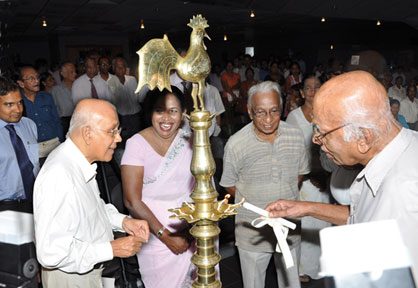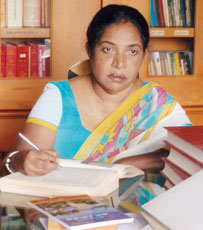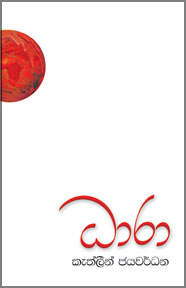Literary portrayal of power at work
By Ranga CHANDRARATHNE
"Power is a basic phenomenon which has interested humanity from Homer
and Greek tragedies until our day. The struggle for political power is
one of the main features of history and dominant themes of literature.
Statementship is the art of using political power adequately.
Revolutionists sometimes devote their whole lives to the 'gaining of
power'…, of getting dominant position in a larger social group. "-N.S
Timasheff on the Power Phenomenon.
 |
|
A rare literary fiesta where the
prominent Sri Lankan writers and linguists converged was
recently held at the M.D Gunasena Auditorium at No 14,
Mihindu Mawatha , Colombo. Will the flames that were lit by
veteran writers such as K.Jayatilake, Gunadasa Amerasekara,
Prof. Sucharitha Gamlath and Dr.Saman Chandra Ranasinghe at
the launch of Dhara be the flames that brighten the future
of Sri Lankan literature? |
"To know the pains of power, we must go to those who have it; to know
its pleasures, we must go to those who are seeking it."
- Charles Caleb Colton (1780 - 1832), Lacon, 1825
Although the above quotations shed light on the two prominent aspects
of the phenomenon of power, the phenomenon of power at work in the novel
Dhara by Kathleen Jayewardene is subtle. For the first time in the
history of Sinhala novel the author Kathleen Jayewardene explores the
phenomenon of power at work at different levels of social strata in
broadest possible manner, extending the scope into the universe and how
it unprecedentedly influences the primordial human relations such as
love and relationships.
At the rudimentary level, the narration is centered on the killing of
a journalist and his mother's search for the killer. The author observes
the power at work not only in the sphere of politics but also how it
functions in the human mind, within the household and the complex
relationships that man maintains with the environment and the animals.
For instance, the politician father of the killed journalist,
Thilakawardene is not interested in finding out the killers of his son.
Instead he is worried more about gaining power.
"She looked at her husband as if she was trying to identify a
stranger….." Thilakawardane's role at the funeral and thereafter is a
passive role. Except the killed journalist's mother Wandana, for others,
Damsak's killing is a passing incident.
"Now she does not entertain the attitude that Thilakawardene has done
injustice to her. She had got rid of these ideas a long time ago. It was
after that the pain of mind lessened and despair overwhelmed her heart.
Since then, her feelings about him were blank as a white paper and once
again, it was turning into dark with the death of the younger son. She
could not, at all, satisfy with his behavour at Damsak's death. She had
only an unpleasant memory of him gathering courage at the funeral to
bear up the grief" .
Use of an intermediary or a spirit
A noteworthy device of the author is the use of an intermediary to
narrate a considerable portion of the novel which particularly deals
with the human conscience, communication with the spirits and animals.
The author has stressed that the device of an intermediary has been used
to 'open up hearts of the animals'. The author states "A part of Dhara
(novel) is allocated to open up hearts of the animals; to file their
indictments. They (animals) question that this murderous culture is
perpetuated only to taste the human tongue….here an intermediary
communicates with animals…this intermediary is created for the
purpose…". The intermediary which is the spirit of the killed journalist
hovers around the world. This is a novel experience for Sinhalese
readers to venture into territories hitherto has not been explored in
this manner.
 |
|
Kathleen Jayewardene |
"A judge who created evidence to convert a minor offence into an
indictment has been solidified as a comet. He is detained in an empty
area beyond the truth. Though he was not manacled, his astral body could
not go beyond the boundaries of truth. He made a confession…I knew
everything before the verdict. The verdict was my pre-determination. I
slowly nodded my head as if trying to understand something new, letting
the two lawyers present the arguments….."
Another instance where the intermediary has been successfully used is
the instance where a bull about to be killed speaks out his heart. The
animal questions the notion of justice. Primarily animals are used to
describe the injustices man caused to them and how animals are being
killed in a cruel manner for human consumption.
The death of the Head of the State has been a major incident where
the function of the power is amply manifested.
The omnipotent leader has suddenly been reduced to a mere commodity
at the hands of the doctors. The Head of the State searches for the
powerful enemy who virtually nullified his powers: "He thought who had
nullified his powers …he wanted to see the enemy and betrayer..Soon he
got hold of a mirror….immediately he could see the enemy ….he helplessly
gazed at his own image frowning at him in the mirror…"
Apart from the power, other principle theme of the novel is spirit or
intermediary. A large part of the narration is by the intermediary of
the killed journalist. Here the author uses the 'stream of
consciousness' in order to overcome time. Damsak's spirit which travels
through the continents meeting other spirits and speaking to animals has
lost sense of time.
"In a few seconds, they have got rid of my fear: I was freed; I was
taken to my usual place.
The timeless and space-less this territory was created to ensure a
rest without troubles of the earth. This is my centre, place of stay; an
area where the absolute truth is. Therefore, I have no enmity with them.
Not even a slightest hatred is in the person who enters this against
those who split, separate and killing that solidified structure of
body…"
The intermediary speaks throughout the narration taking the readers
to the desolate poles, into the bottom of the ocean, into the worlds of
animals, corridors of power where politicians enjoy the comfort of
concubines cum secretaries, to the newspaper offices and into the sphere
of social service.
One of the prominent features of the novel is the attempts on the
part of the author to apply the concept of power in ethnic relations
between diverse ethnic groups. The author has made use of some of the
reports on incidents associated with the conflict in an objective
manner. The author has exercised extreme care either not to personalise
or to depict the incidents to the advantage of the parties to the
conflict.
Post modernist aspects of the novel
The novel also manifests some of the prominent post modernist
aspects. For instance, the use of an intermediary as a narrator is a
novel approach even in the Western novel. Shifting of the narration to
peripheral incidents such as turbulent political environment, death of
the Head of the State, corruption has widened the scope of the novel
touching on many aspects. Kathleen has experimented with a new narrative
technique unique to Sinhala novel.
 It is a technique demanded by the story. Since the novel deals with
many subjects at different levels in in-depth manner, it can be
subjected to different readings from diverse perspectives. For example,
through the complex character of Vandana, the author questions the
social validity of some of the age old notion on ideal mother and wife
particularly in Asian society. So the novel can be subjected to a
reading from a feminist perspective. What manifest in the amalgamation
of the so many different aspects of socio-economic life is the author's
wide understanding of the Western novel, modern literary theory and
familiarity with latest developments in the field of literature. It is a technique demanded by the story. Since the novel deals with
many subjects at different levels in in-depth manner, it can be
subjected to different readings from diverse perspectives. For example,
through the complex character of Vandana, the author questions the
social validity of some of the age old notion on ideal mother and wife
particularly in Asian society. So the novel can be subjected to a
reading from a feminist perspective. What manifest in the amalgamation
of the so many different aspects of socio-economic life is the author's
wide understanding of the Western novel, modern literary theory and
familiarity with latest developments in the field of literature.
Apt language
The novel Dhara stands out for its narrative sensitive diction. The
author skillfully manipulated and exploited the intrinsic properties of
Sinhala language. Language takes the course of narration and at times it
assumes highly philosophical tone and at other times, it becomes almost
colloquial. However, the author has used classical Sinhalese idiom
enriching the contemporary Sinhalese language. As the taste of the
sugarcane is while it's being munched up in the mouth, it is up to the
readers to enjoy the novel Dhara. An outstanding feature of the novel is
contextual clarity though dealt with a web of concepts and an impressive
syntax. The novel in terms of material and the presentation maintains
very high standards, it can reach audiences beyond our shores due to its
universal appeal.
|

